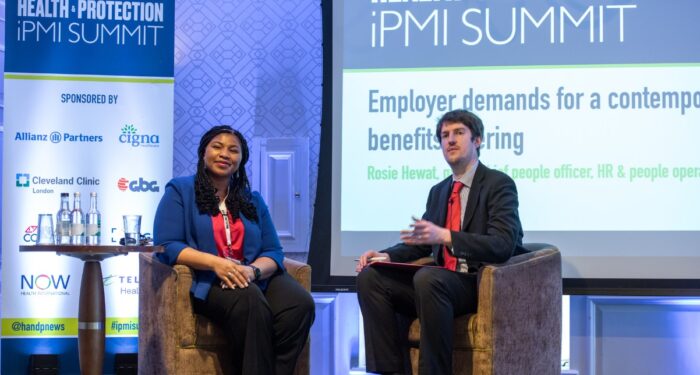It is dangerous for organisations not to cater for younger employees – particularly how they communicate and their willingness to make requests such as for mental health days, according to fintech provider Kuda.
Closing out the Health & Protection IPMI Summit yesterday, Rosie Hewat, group chief people officer, HR and people operations at Kuda, revealed the firm has seen a dramatic increase in Gen Zs – workers born after 1996 and before 2013 – across its global operations in the last two years.
And this increase has required a change in mindset for the organisation.
“What we have also found is that we have had to train our managers specifically on how to manage Gen Z as we saw we were having an increase in Gen Zs,” Hewat (pictured left) said.
“Their style of communication and expectations are very different. We had to train our managers how to manage effectively. The L&D offering in the business is something we are very proud of.”
And she warned firms who might want to let their culture and organisation evolve without a definite plan.
“Sometimes people think they can let things happen organically,” she continued.
“I think that is very risky and very dangerous. Sometimes you do need to realise that a certain demographic prefer to be communicated with in a different way.”
‘Not being rude’
Hewat further explained this new generation also tended to respond in a different way.
“They are receptive to things differently. What might be appealing to me and what I get excited about, they might say meh,” she said.
“So it’s also training the managers to know that you have this group of people and this group of people that we’re looking for, and you’re not going to be able to have one approach that fits all in your one-to-ones.
“We can provide you with teachings and a guide to help kick off conversations but you also need to take a step back and look at things from their perspective and the way that they communicate which at times may seem a bit rude.
“Understanding that attitude, they’re not being rude, it’s how they communicate. It’s just little things to help the environment a little better.”
And Hewat also revealed that this generation’s different mindset extends to what they demand from their employer in terms of health support.
“You will have Gen Zs that will often take a mental health day versus the rest of the company,” she said.
“They will say I need a mental health day and it’s fine – take care of yourself, come back fine, but I think that’s more Gen Z than the rest of team.”






